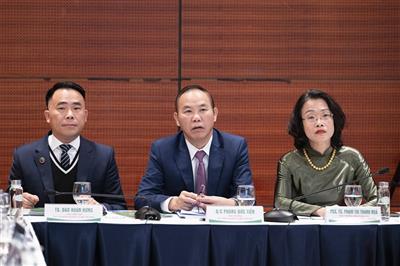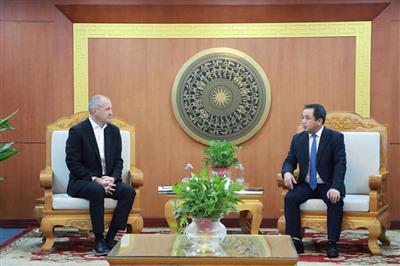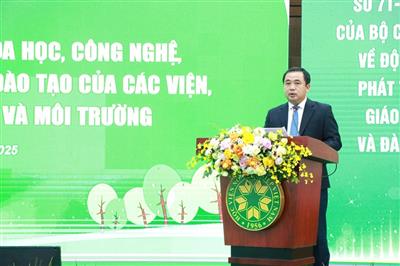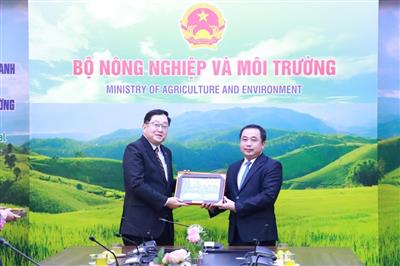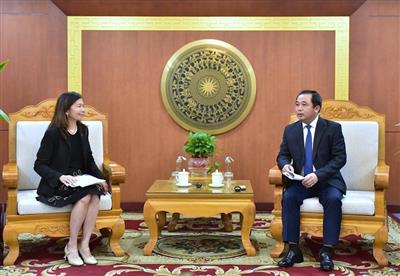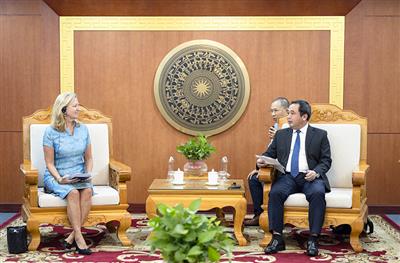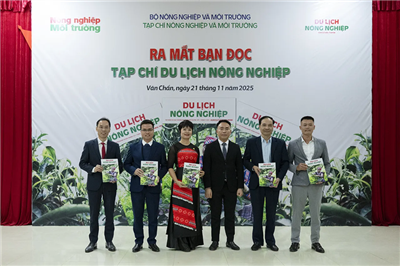
Vietnam seeks to strengthen environmental cooperation with Singapore
23/11/2024TN&MTOn the sidelines of the 29th Conference of the Parties to the United Nations Framework Convention on Climate Change (COP29) in Azerbaijan, Deputy Minister of Natural Resources and Environment Le Cong Thanh held a bilateral meeting with Mr. Stanley Loh, Permanent Secretary of Sustainability and Environment of Singapore.

Deputy Minister of Natural Resources and Environment Le Cong Thanh speaking at the meeting
During the meeting, Deputy Minister Stanley Loh expressed a strong desire to expand cooperation with Vietnam in various areas, including renewable energy development, carbon markets, pollution control, air quality management, plastic waste reduction, and other shared environmental concerns in the region.
Acknowledging the positive outcomes achieved under the Memorandum of Understanding on Cooperation between Vietnam's Ministry of Natural Resources and Environment and Singapore's Ministry of Sustainability and the Environment, Deputy Minister Le Cong Thanh noted that Vietnam is actively promoting initiatives such as waste segregation at the source and recycling, in line with its Environmental Protection Law. He also expressed an eagerness to learn from Singapore, widely recognized as one of the cleanest countries in the world.
Air pollution—particularly transboundary air pollution—was highlighted as a pressing issue requiring consensus among regional countries. Deputy Minister Le Cong Thanh emphasized that Hanoi is currently experiencing its poorest air quality of the year, prompting heightened public and governmental interest in finding effective solutions.
On renewable energy development, Vietnam is working to improve policies related to rooftop solar power, direct power purchase agreements, and offshore wind energy. Both countries have proposed the idea of developing a clean and green electricity transmission network connecting nations, with Vietnam planning a pilot project through its Ministry of Industry and Trade.

Mr. Stanley Loh, Permanent Secretary of Sustainability and Environment of Singapore, sharing Singapore's experiences in environmental protection and climate change response
The Ministry of Natural Resources and Environment has also proposed amendments to regulations governing carbon credit trading under Article 6 of the Paris Agreement. Deputy Minister Le Cong Thanh noted that Singapore’s experience in this area would provide valuable insights for Vietnam.
Mr. Stanley Loh shared Singapore’s experiences, emphasizing that waste segregation and recycling can evolve into a green industry that creates jobs while significantly mitigating environmental pollution risks. He cited innovative solutions, such as recycling electronic waste, plastics, and electric vehicle batteries, as having tremendous potential beyond national borders. For example, Singapore has successfully recycled electric vehicle batteries and converted used cooking oil into jet fuel, paving the way for a mandate by January 2026 requiring airlines to use a certain percentage of sustainable aviation fuel. Such green economic solutions, he suggested, could be piloted in Vietnam–Singapore industrial parks and economic zones.
Given the current shortage of renewable energy sources, Singapore emphasized the importance of transitional energy sources, such as liquefied natural gas (LNG), and advocated for ASEAN cooperation to encourage the use of nuclear power, provided the highest safety standards are maintained.
Deputy Minister Le Cong Thanh discussed Vietnam's policy directions on recycling, reducing imports of untreated plastic waste, and increasing the use of recycled materials. He also expressed Vietnam’s interest in studying international experiences with sustainable aviation fuel and learning from Singapore in this area. Vietnam aims to advance clean energy development in industrial parks to attract investment and is also considering restarting nuclear power projects to ensure a stable energy supply for economic growth and carbon emissions reduction. These plans may involve a mix of traditional and renewable power sources.
Regarding carbon credit trading under Article 6 of the Paris Agreement, Vietnam is amending its laws to enable immediate implementation without a pilot phase and is seeking to exchange experiences with Singapore on this matter.
On the issue of plastic pollution, Singapore noted that a complete ban is impractical, as many countries lack viable alternatives. Instead, ASEAN should conduct a study on transboundary plastic pollution and develop a collective agreement with strong determination.
Vietnam agreed with this perspective, suggesting that tackling plastic pollution, like addressing climate change, should adhere to the principle of “common but differentiated responsibilities.” Instead of outright bans, efforts should focus on improving recycling capacity and combating ocean plastic waste to mitigate its impacts on tourism and the maritime economy.
During the meeting, the two sides exchanged views to clarify their bilateral cooperation priorities in combating climate change, protecting the environment, and managing water resources. Vietnam’s Ministry of Natural Resources and Environment expressed its desire for Singapore’s Ministry of Sustainability and the Environment to continue sharing practical experiences in sustainable water resource management and policy development. The ministry also sought Singapore’s support in transferring advanced technologies for water conservation and wastewater treatment while enhancing expert exchanges and learning from Singapore’s experience in environmental protection planning and zoning.
Ngoc Huyen (NRE Newspaper)




